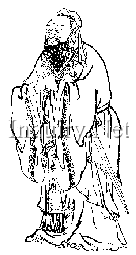This category includes Confucianism, Taoism, and other ancient Chinese philosophies. More than 225 million people follow these religious paths; most of these are in China.
Confucianism
K'ung Fu Tzu (Confucius in English) was born in 551 BCE in China in what is
now Shantung Province. He lived during the Chou dynasty, known for its moral
laxity. Later in life, he wandered through China, giving advice to various
rulers. He accumulated a small band of disciples and during the last years of
his life he devoted himself to teaching. His writings deal primarily with
individual morality and ethics, and the proper exercise of political power by
the rulers.
China in what is
now Shantung Province. He lived during the Chou dynasty, known for its moral
laxity. Later in life, he wandered through China, giving advice to various
rulers. He accumulated a small band of disciples and during the last years of
his life he devoted himself to teaching. His writings deal primarily with
individual morality and ethics, and the proper exercise of political power by
the rulers.
There are several sacred texts within Confucianism. These were assembled by Chu Hsi (1130-1200 CE). They include the Si Shu or "Four Books" and the Wu Jing or "Five Classics". One of the Five Classics is the I Ching. This is a meditation system involving 64 hexagrams composed of broken and continuous lines. Some believe that the I Ching can foretell the future.
Confucianism does not have many of the elements of other religions, like Christianity and Islam. It is primarily an ethical system to which rituals have been added at important times during one's lifetime. Confucian ethical teachings stress honesty and trustworthiness, righteousness, benevolence, humaneness towards others, and love of parents for their children and of children for their parents.
Taoism
Tao (pronounced "Dow") can be roughly translated into English as "path", or "the way". It refers to a power which envelops, surrounds and flows through all things, living and non-living.
The founder of Taoism is believed by many to be Lao-Tse (604-531 BCE), a
contemporary of Confucius. He searched for a way to avoid the constant feudal
warfare and other conflicts that disrupted society during his lifetime. Taoism
started as a combination of psychology and philosophy but evolved into a
religious faith in 440 CE when it was adopted as a state religion. Taoism, along
with Buddhism and Confucianism, became one of the three great religions of
China. In 1911, state support for Taoism ended and much of the Taoist heritage
was destroyed. After the Chinese revolution in 1949, religious freedom was
severely restricted.
(604-531 BCE), a
contemporary of Confucius. He searched for a way to avoid the constant feudal
warfare and other conflicts that disrupted society during his lifetime. Taoism
started as a combination of psychology and philosophy but evolved into a
religious faith in 440 CE when it was adopted as a state religion. Taoism, along
with Buddhism and Confucianism, became one of the three great religions of
China. In 1911, state support for Taoism ended and much of the Taoist heritage
was destroyed. After the Chinese revolution in 1949, religious freedom was
severely restricted.
Taoist texts include the Tao-te-Ching (The Way of Power) which is believed to have been written by Lao-Tse. It describes the nature of life, the way to peace and how a ruler should lead his life. The Chuang-tzu contains additional teachings.
Taoists believe that Tao is the first-cause of the universe. It is a force that flows through all life. Each believer's goal is to become one with the Tao. The concept of a personified deity is foreign to them. Thus, they do not pray because there is no god to hear the prayers or to act upon them. They seek answers to life's problems through inner meditation and outer observation. Taoists believe in the duality of the universe. This is symbolized by the yin-yang.